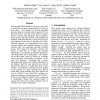Free Online Productivity Tools
i2Speak
i2Symbol
i2OCR
iTex2Img
iWeb2Print
iWeb2Shot
i2Type
iPdf2Split
iPdf2Merge
i2Bopomofo
i2Arabic
i2Style
i2Image
i2PDF
iLatex2Rtf
Sci2ools
157
click to vote
VLDB
2001
ACM
2001
ACM
LEO - DB2's LEarning Optimizer
Most modern DBMS optimizers rely upon a cost model to choose the best query execution plan (QEP) for any given query. Cost estimates are heavily dependent upon the optimizer’s estimates for the number of rows that will result at each step of the QEP for complex queries involving many predicates and/or operations. These estimates rely upon statistics on the database and modeling assumptions that may or may not be true for a given database. In this paper we introduce LEO, DB2's LEarning Optimizer, as a comprehensive way to repair incorrect statistics and cardinality estimates of a query execution plan. By monitoring previously executed queries, LEO compares the optimizer’s estimates with actuals at each step in a QEP, and computes adjustments to cost estimates and statistics that may be used during future query optimizations. This analysis can be done either on-line or off-line on a separate system, and either incrementally or in batches. In this way, LEO introduces a feedback ...
Related Content
| Added | 30 Jul 2010 |
| Updated | 30 Jul 2010 |
| Type | Conference |
| Year | 2001 |
| Where | VLDB |
| Authors | Michael Stillger, Guy M. Lohman, Volker Markl, Mokhtar Kandil |
Comments (0)

